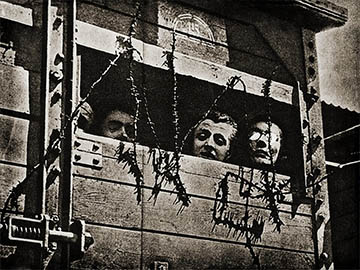Irmfried Eberl - T4 and Operation Reinhardt member

Irmfried Eberl (born on September 8, 1910, died on February 16, 1948) - Austrian Nazi, SS officer with the SS Untersturmführer rank, PhD in medical sciences, one of the main participants in Operation T4, the first commandant of the Treblinka, Nazi German extermination camp, head of the euthanasia center in Bernburg.
Eberl came from a family which followed the Volkist ideology and was associated with the Nazi movement. Irmfried himself graduated in medicine in Austria, but due to his NSDAP membership and involvement in underground Nazi activities, in 1936 he was deprived of the right to practice as a doctor in Austria.
In connection with this event, Irmfried Eberl emigrated to Germany, where he was employed in the medical services. In 1937, his medical diploma was officially recognized. He started working at the Main Health Office in Berlin. In the same year, he married Ruth Rehm, who was a wealthy and influential person who actively supported the Nazi movement.
On January 31, 1940, he was assigned to action T4, where he supervised the extermination of the sick and disabled, as well as sick and exhausted prisoners of concentration camps, who were brought under action "14f13" (Sonderbehandlung 14f13). He worked, inter alia, at the center in Bernburg.
After Operation T4 ceased, he was transferred to the eastern front in the vicinity of Minsk, participating in the so-called Osteinsatz (Action "East"), and then was assigned to Operation "Reinhardt". Irmfried Eberl was appointed the commander of the German Nazi death camp in Treblinka.
Eberl, who had so far supervised the extermination of relatively small groups of sick and disabled people, was unable to manage the extermination camp. In the initial phase, the extermination camp was not able to kill the number of people deported to Treblinka, mainly from the Warsaw Ghetto.
It happened frequently that the deported died in wagons on the railway siding, where they awaited being murdered in the gas chambers for several dozen hours. Gravediggers' commandos did not keep up with burying the corpses, and the stench of decaying corpse was felt in the vicinity of several kilometers.
As a result of the chaos and the lack of the expected amounts of the plundered gold, Eberl was dismissed from the position of the camp commandant, and then returned to the position of the head of the center in Bernburg.
Little is known about his activities between 1943-1944. According to some sources, Irmfried Eberl participated in secret research on deported prisoners, including to the concentration camp Auschwitz Birkenau. It is known, however, that his wife was killed in July 1944 during the Allied air raids. In the fall of 1944, he was sent to the Western Front as a military doctor. In April, he was captured by the US forces. He managed to stay unrecognized and was released in June 1945.
After the war, he hid his crimes, stating that in the period from 1937 to 1944 he worked at the Central Health Office in Berlin. He got married for the second time, ran a private medical practice, and in 1947 became a father.
In August 1947, a court in Bernburg issued a warrant for the arrest of Eberl as a suspect in the crimes committed at the Bernburg facility. He was arrested, interrogated and recognized as the head of euthanasia centers under Operation T4 by one of the nurses working there.
Fearing the discovery of all his crimes, on February 16, 1948, he committed suicide in custody in Ulm, avoiding responsibility for the crimes he committed.
Archival photos - public domain. If copyright has been violated, please contact me. The photos have been added for information, not for profit or for surreptitious advertising.


